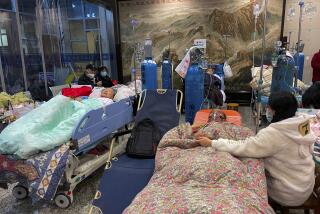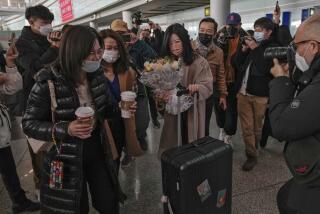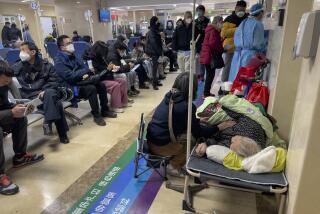China Takes the Offensive on SARS
- Share via
BEIJING — As winter approaches and temperatures start to plunge in the country where SARS first appeared, vigilance has become the weapon of choice against a repeat of the worldwide health threat that killed nearly 800 people this year.
“We are quite concerned SARS will come back in the winter,” said Julie Hall, an official with the World Health Organization in Beijing. “Even if we never see SARS again, we will see other emerging diseases in the future. What’s important is that we plan and be vigilant for many years to come.”
Knowing that severe acute respiratory syndrome tends to thrive in the cold -- and mindful of its failure to react quickly to last winter’s epidemic -- the Chinese government has accelerated a nationwide early detection and response system.
The Chinese capital has resumed 24-hour surveillance to receive daily SARS updates from all area hospitals. Soon it plans to set up an Internet-based reporting system to connect 60,000 hospitals and local disease-control centers around the country. Beijing has also opened clinics so that patients with respiratory diseases and high fever may be kept under observation. At some of the nation’s airports, officials are again checking temperatures of travelers to identify those who might be sick.
So far, no suspected SARS cases have been found.
In Hong Kong, the hardest-hit area outside mainland China, the government has spent $60 million to prepare for a possible return of the virus. Health officials say they are ready for the worst -- but not expecting it.
“The epidemic, if it comes, should be smaller and detected earlier,” said William Ho, chief executive of Hong Kong’s Hospital Authority. “I’m confident.”
The pneumonia-like disease and China’s initial mishandling of the outbreak set off a global health alarm. The epidemic claimed 774 lives, three-quarters of them in China, and damaged the economies of several Asian countries. According to the Asian Development Bank, the outbreak cost nations in the region an estimated $18 billion -- more than half of it in Hong Kong and mainland China.
Not only was Beijing caught unprepared, but its effort to conceal the extent of the outbreak also tarnished its global reputation and allowed the virus to spread farther than it otherwise could have.
Amid international pressure, China’s new leadership took action in mid-April, firing the health minister and Beijing’s mayor and initiating a series of draconian measures, including quarantining entire apartment buildings, hospitals and universities to contain the virus.
“SARS was big shock to the system. It taught us that if you lie about the disease, it could spread like wildfire,” said Yang Fengchun, a Beijing University public policy analyst. “No one will dare hide the truth again.”
But some Beijing officials are still concerned about the city’s preparedness.
“Beijing still lacks open and transparent monitoring networks and information-reporting systems to cope with emergency health crises,” Beijing Vice Mayor Niu Youcheng said last week, according to state media.
Awareness of the problem, many experts believe, can go a long way toward deterring another health crisis.
“We think the Chinese government has learned the lessons of last time,” said Hall, the WHO official. “They may miss the first case of SARS -- that’s possible anywhere in the world. But we don’t think they would miss the first cluster of SARS. We’re pretty confident they will respond appropriately.”
The first known victim of SARS -- a 46-year-old from the city of Foshan in the southern province of Guangdong -- contracted the virus last November. No vaccine has been developed to combat the disease. Medical professionals remain uncertain of how to best treat the disease.
Despite this, public health officials in Hong Kong remain confident that they have taken the measures necessary to contain any outbreak efficiently.
Health officials in Hong Kong are weighing the pros and cons of the antiviral drug Kaletra and a pharmaceutical cocktail that includes another antiviral drug, ribavirin, both used in treating AIDS. Doctors also have not ruled out the use of steroids despite evidence in Hong Kong that about 100 SARS patients treated with steroids have developed a rare degenerative bone disease, avascular necrosis.
Experts also note especially high survival rates among mainland Chinese patients who were treated with a traditional herbal medicine with properties similar to ribavirin.
“There is no complete agreement on treatment,” acknowledged Hong Kong’s health secretary, E.K. Yeoh.
As the gateway city through which SARS spread to nearly 30 countries, Hong Kong has overhauled its approach to handling infectious disease. High-level communications lines have been created to enable Hong Kong and the Guangdong provincial government to share health-related information. Hong Kong officials said during last winter’s SARS outbreak, they were not informed what was happening in the neighboring province.
“We couldn’t reach anyone in Guangzhou,” Yeoh said, referring to the provincial capital. “Every communication had to go through Beijing first.”
To step up its efforts, the territory has created 1,500 isolation beds in the city’s hospitals. A year ago, Hong Kong had only about 100 isolation beds. A plan is also in place to divide hospitals into zones to prevent SARS from spreading within the facilities.
Ho, who contracted SARS in March while carrying out his duties as head of the Hospital Authority, asserted: “We’re very geared up.”
More to Read
Sign up for Essential California
The most important California stories and recommendations in your inbox every morning.
You may occasionally receive promotional content from the Los Angeles Times.










